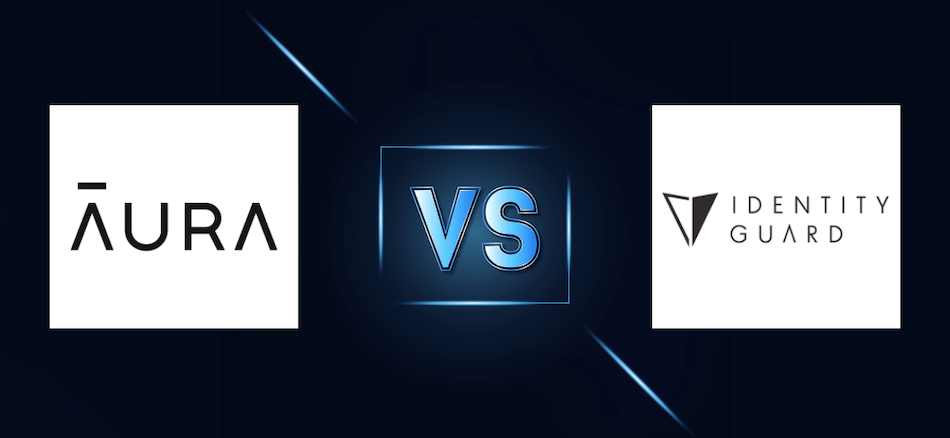
Choosing between Identity Guard and Aura can be tricky, so let’s break down their features, costs, and user experience to help you make the best choice. In this article, we’ll compare their key offerings, insurance coverage, and ease of use, so you can see which one fits your needs best.
Both services have their strengths. Identity Guard has been around for decades and offers excellent identity monitoring tools and social media oversight, keeping your personal information safe. Aura, however, offers a more all-around approach with added digital defenses like antivirus protection, VPN, and parental controls, making it great for families.
We’ve taken a close look at how quickly they respond to identity threats, the accuracy of their alerts, and overall user experience. We’ve also checked out customer feedback and expert opinions to give you a fair comparison. By the end of this article, you’ll know which service suits you best and why you can trust our recommendations.
| Aura | Identity Guard | |
| Website | Aura.com | IdentityGuard.com |
| Pricing | $9 – $25/month | $6.67 – $23.99/month |
| Money-back guarantee | 60 days | 60 days |
| 3-bureau credit monitoring | Yes (Experian, TransUnion, and Equifax) with all plans | 1-bureau or 3-bureau (Experian, TransUnion, and Equifax) with top-tier plans |
| 24/7 customer support | Yes | Yes (for identity theft emergencies) |
| Identity theft insurance | Up to $1 million (up to $5 million with the family plan) | Up to $1 million |
| Best deal | 68% Off Coupon > | 40% Off Coupon > |
Key takeaways from Aura and Identity Guard comparison
Aura offers comprehensive identity theft protection across all plans, including features like antivirus, VPN, and parental controls, while Identity Guard provides tiered levels of service with strong identity monitoring and risk assessment tools.
Both services offer up to $1 million in identity theft insurance for individuals However, Aura raises the stakes for families with up to $5 million in coverage and provides 24/7 customer support compared to Identity Guard’s limited hours.
Aura’s plans include rapid alerts and additional digital defenses, making it highly suitable for families seeking all-encompassing security. Identity Guard’s strengths lie in its advanced tools for identity monitoring and social media oversight.
In terms of value, Aura takes the lead, particularly when you take advantage of this 68% off coupon.
How to select the right identity theft protection service: Aura vs Identity Guard
Before diving into our detailed comparison of Aura and Identity Guard, let’s quickly go over how to pick the right identity theft protection service:
Monitoring: Services like Aura and Identity Guard keep a close watch on different data points to detect identity theft. They monitor public records, credit files, and even the dark web to see if your personal information is at risk. This thorough monitoring acts as an early warning system to catch threats before they become big problems.
Protection: Besides monitoring, these services help safeguard your info with tools like antivirus software, secure browsing, and spam call blocking. They can also help remove your personal information from data brokers and other risky places online, lowering the chance of identity theft.
Notifications: Getting timely alerts is key to stopping identity fraud in its tracks. Aura and Identity Guard send out fraud alerts to let you know about any suspicious activity so you can act fast.
Resolution: If identity theft happens, both Aura and Identity Guard have dedicated support to help you through the process. They also offer insurance to cover eligible expenses and losses, giving you the financial support you need to recover.
Now, let’s compare Aura and Identity Guard to see which one is the best fit for your identity theft protection needs.
Aura vs Identity Guard: Side-by-side comparison
Let’s compare Aura and Identity Guard side-by-side to help you find the perfect fit for your identity protection needs. Here’s a quick overview of their key features:
| Aura | Identity Guard | |
| Pricing | $9 – $25/month (with coupon) | $6.67 – $23.99/month |
| Family-focused plans and features | Yes | Yes (but no parental controls) |
| 3-bureau credit monitoring and reports | Yes (Experian, TransUnion, and Equifax) with all plans | 1-bureau or 3-bureau (Experian, TransUnion, and Equifax) with top-tier plans |
| Dark web monitoring and alerts | Yes | Yes |
| Identity theft insurance | Up to $1 million (up to $5 million with the family plan) | Up to $1 million |
| Social media account alerts | No | Yes |
| Credit lock | Yes | Yes |
| Lost wallet remediation | Yes | Yes |
| Antivirus and VPN | Yes | No |
| Password manager | Yes | Yes |
| 24/7 customer support | Yes | Yes (for identity theft emergencies) |
| Best deal | 68% Off Coupon > | 40% Off Coupon > |
Aura vs Identity Guard: Which company is more trustworthy?
When evaluating the trustworthiness of identity theft protection services, it’s essential to consider their reputation, user base, and adherence to industry best practices.
Now, let’s take a closer look at both of our contenders.
Aura overview

Launched in 2014 by Hari Ravichandran after his own credit information was compromised, Aura is all about making the internet safer. Today, it serves over a million members worldwide, all striving for online confidence.
Aura’s dedication to a seamless user experience hasn’t gone unnoticed – it has earned accolades from Mom’s Choice Awards, Inc. Magazine, and Forbes. Its TrustScore of 4.6 on Trustpilot, based on 545 reviews, speaks to their commitment to service excellence.
By acquiring Identity Guard, Aura has expanded its offerings to include tailored plans for individuals, couples, and families. These plans feature advanced cybersecurity tools like antivirus software, VPN, and a password manager, ensuring strong protection against digital threats.
Aura pros and cons
Let’s delve into the pros and cons of choosing Aura for your digital identity protection.
+ Pros
- Antivirus software across all plans
- Comprehensive identity theft protection and credit monitoring services
- Dark web monitoring
- Fraud call protection
- Up to $1 million in insurance coverage
- Plans for individuals, couples, and families
- Useful parental control app
- Password manager and VPN included
- 24/7 customer support and fraud resolution
- Transparent pricing
- 3-bureau credit monitoring included in all plans
– Cons
More expensive than some competitors
See the latest Aura prices and deals: https://aura.com/save-50-offers
Identity Guard overview
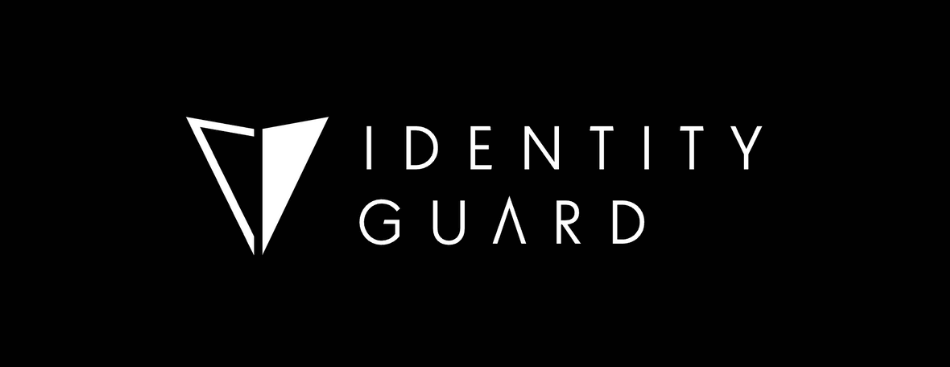
Founded in 1996, Identity Guard has been a trusted name in identity theft protection for over two decades, now operating under Aura. With a long history of reliability, Identity Guard is dedicated to safeguarding your digital identity in an increasingly risky online world.
Identity Guard’s commitment to excellence is evident in its 4.1 TrustScore on Trustpilot, based on 4,468 user reviews. However, about 10% of users have given it a one-star review, mentioning issues like login problems, difficulties with cancellation, unexpected auto-renewal charges, and unreceived refunds. Despite these concerns, Identity Guard remains a respected name in identity protection, offering robust monitoring services and social media oversight to keep your personal information safe from evolving threats.
Identity Guard pros and cons
Identity Guard, like any service, has its downsides. Among its array of features, you’ll find:
+ Pros
$1 million in identity theft insurance on all plans
AI-powered identity monitoring
Extra alerts are helpful
Simple-to-understand, upfront pricing
US-based customer support
Comprehensive individual or family coverage
Password managers included in all plans
Family plan protects an unlimited number of children
Budget-friendly basic plan
Predictive risk management score
– Cons
Pricey high-tier plan
Monthly credit score or credit card monitoring requires a more expensive plan
- No parental control tools
Limited cybersecurity tools
Is Aura or Identity Guard more trustworthy?
Aura’s unwavering commitment to comprehensive digital security significantly enhances its trustworthiness among users. Notably, Aura has maintained a stellar reputation, free from any major security incidents or controversies. On the other hand, Identity Guard, while highly respected, has faced occasional criticism regarding its customer support and service cancellations.
Trustworthiness winner: Aura
Availability and insurance coverage: Does Aura or Identity Guard offer more comprehensive protection?
When it comes to protecting your identity, both Aura and Identity Guard have your back with up to $1 million in identity theft insurance for individual plans. However, Aura really steps it up for families, offering coverage up to $5 million, while Identity Guard sticks with $1 million.
All of Aura’s plans include up to $1 million in coverage for each adult, $2 million for couples, and $5 million for families. This includes a solid reimbursement for stolen funds, helping you bounce back if identity theft happens. Identity Guard also provides $1 million in coverage for legal fees, lost wages, and other expenses, but you’ll need to show proof of your losses.
Aura works on multiple platforms, making it easy to protect your digital life no matter where you are. You can use Aura on macOS, Windows, iOS, and Android devices. Plus, their mobile apps for iOS and Android let you manage your identity protection on the go. For safer browsing, Aura also offers browser extensions compatible with popular web browsers, ensuring a smooth and secure online experience.
Identity Guard is a cloud-based service that you can access through your browser, with mobile apps for both Android and iOS. The mobile apps are great for quick checks and alerts, but for more detailed management, the desktop version is the way to go.
Availability and insurance coverage winner: Aura
See Aura’s coverage details here >
Core identity protection capabilities: Who wins Aura and Identity Guard face-off?
Aura and Identity Guard both have superb identity monitoring services, each with its own unique features. To choose the best one for you, it’s important to look at what each offers. Both services keep an eye on your credit, scan the dark web for your personal info, and help protect your bank accounts.
Credit monitoring across the bureaus
| Aura | Identity Guard | |
| What does credit monitoring include? | – Three-bureau credit monitoring – Checking, savings, and investment account monitoring – Payday loan monitoring – Credit lock | – Three-bureau credit monitoring – Monthly Equifax credit score updates – Experian credit lock |
| See coverage details > | See coverage details > |
Aura keeps a close watch on your credit reports from Equifax, Experian, and TransUnion, so nothing slips by unnoticed. Any changes or inquiries made to your credit files are detected swiftly, and Aura sends you an alert right away, empowering you to act quickly to prevent potential fraud. You also get regular monthly credit scores and an annual credit report. However, credit reports are available just once a year, and no credit simulators or financial planning tools exist.
Meanwhile, we found that only two out of three Identity Guard plans include monitoring for all three credit bureaus, alerting you to early signs of fraud. The “Ultra” plan notifies you of suspicious activities via email, text, or phone, allowing quick action to protect your financial information. The “Total” plan offers daily monitoring and credit score updates but no credit reports. The “Value” plan doesn’t offer credit monitoring at all.
Compared to other services, Identity Guard’s “Value” plan lacks credit monitoring, which even some basic plans from competitors offer. However, the higher-tier plans provide robust monitoring and alerts that can help safeguard your financial health.
Credit monitoring winner: Aura
Dark web surveillance
Regarding the dark web, both Aura and Identity Guard are like digital detectives, tirelessly searching for traces of your personal information among cybercriminals. With Aura, you get dark web alerts in all plans. Their advanced tools scan thousands of sites daily, and if anything suspicious pops up, Aura quickly alerts you so you can secure your accounts.
Identity Guard also keeps a close eye on the dark web, even with its “Value” plan. They monitor 24/7 for any suspicious activity involving your SSNs, credit card details, and health insurance IDs. With IBM Watson’s help, Identity Guard scans black market websites, chat rooms, and underground forums. If your data is detected, they send you detailed alerts and helpful advice on how to protect your accounts.
Both services provide strong defenses and timely alerts, giving us peace of mind knowing our personal information is being vigilantly monitored.
Dark web surveillance winner: Tie
Financial and investment account safeguards
When it comes to keeping our financial accounts secure, both Aura and Identity Guard really step up. Aura’s real-time alerts quickly flag any suspicious activities in our financial accounts. The best part is, that this comprehensive protection extends across all of Aura’s plans. They monitor unusual spending and even transactions that might not show up on a credit report, like payday loans. Plus, Aura’s remediation services and lost wallet protection are lifesavers if you ever lose your wallet or get robbed.
On the other hand, Identity Guard also provides excellent monitoring for unauthorized transactions and offers actionable advice to help strengthen our financial defenses. The only hiccup is that their remediation services aren’t included in all plans, which can be a bit of a drawback when dealing with the hassle of restoring our identity. While their insurance coverage is solid, having someone to guide us through the remediation process is incredibly valuable.
Both services offer annual credit reports from the top three credit bureaus and include features that protect our investment accounts and credit cards. They also provide dark web monitoring and check any other data connected to our SSN and personal information. Overall, we’ve found that both Aura and Identity Guard are dedicated to protecting our financial health. Still, Aura wins this round for offering consistent credit monitoring across all plans.
Account safeguards winner: Aura
Which service has better core identity protection features?
From our experience, Aura takes the lead here with its comprehensive and consistent credit monitoring available in all plans. This means everyone gets access to important financial health features. Aura also shines with its real-time alerts and strong remediation services, adding an extra layer of security and peace of mind.
Core identity protection feature winner: Aura
Additional digital defenses: Who offers better extras?
Beyond the core capabilities of identity protection, Aura and Identity Guard offer additional digital defenses to enhance their services.
Antivirus and VPN protection
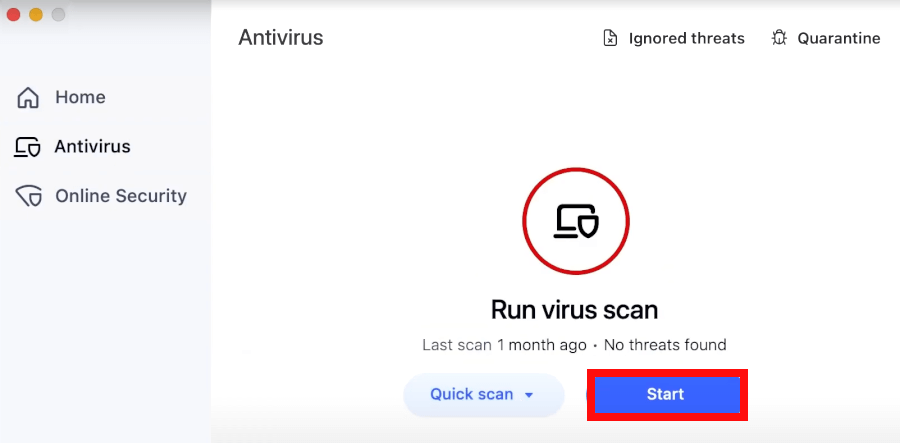
Aura includes antivirus and VPN protection in all its plans, while Identity Guard focuses more on monitoring and alerts, skipping the antivirus software. With Aura, you get a VPN that encrypts your internet browsing, making it super tough for anyone to spy on you. Their antivirus software is always on guard against malware threats.
Aura’s VPN uses AES-256 encryption, which is top-notch for keeping your internet connection secure, especially when you’re on public Wi-Fi. Even though Aura is based in the US (FVEY), its strict no-logs policy ensures your browsing habits stay private.
Ad and tracker blocking browser extension
Ad and tracker blocking are key to keeping your online activity private and free from annoying ads.
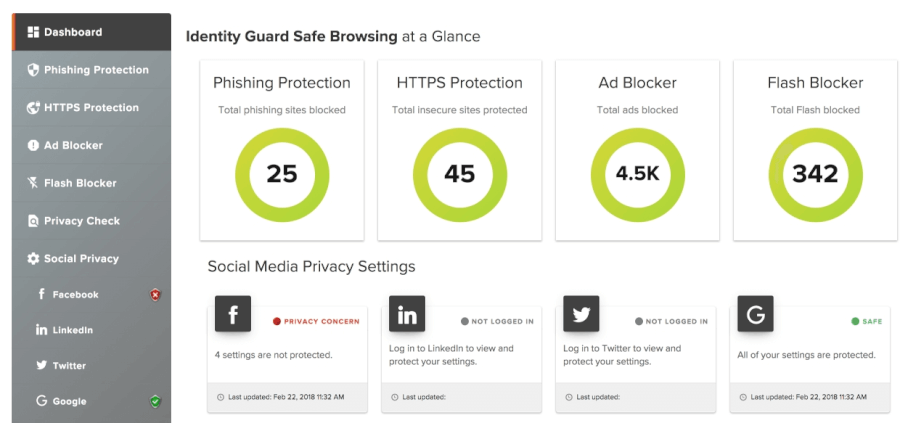
Identity Guard’s safe browsing features do a solid job of blocking ads and trackers, helping protect against invasive tracking and targeted ads.
Aura takes it a step further with its advanced ad and tracker-blocking technology.
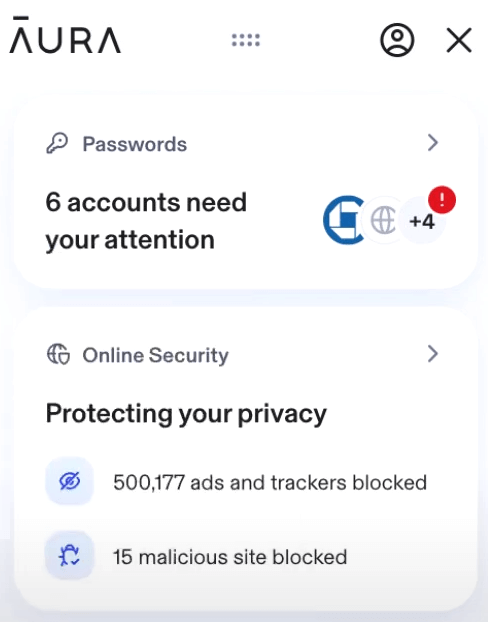
We’ve found the Aura browser extension, compatible with Chrome, Firefox, and Edge, to be super effective in blocking digital tracking across all our devices. Just keep in mind that it relies on a browser extension, so if you want more comprehensive protection, a VPN ad-blocker might be a better choice since it covers all browsers and apps.
Password manager
Keeping our digital lives secure is crucial, and both Aura and Identity Guard have got us covered with their password managers.
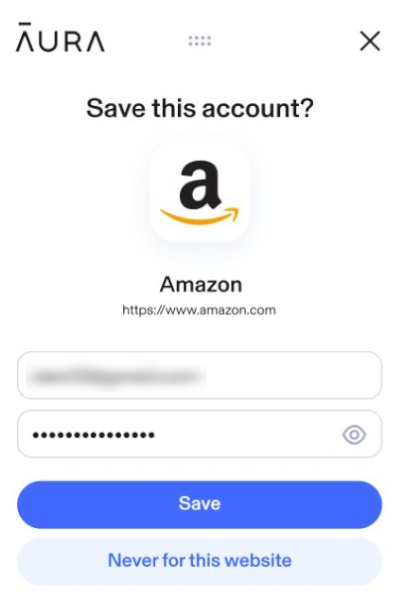
We’ve found Aura’s password manager incredibly user-friendly and included in all their plans. It ensures our passwords are unique and secure, giving us peace of mind. Plus, each adult gets 1 GB of secure cloud storage in the Vault for important documents and passwords. And for the kids? Aura lets us set up profiles for them too, creating a secure online environment for everyone.
Identity Guard also offers a great password manager across its plans. It’s a lifesaver for storing our passwords securely, so we don’t have to remember each one. It even gives us a heads-up if our credentials are weak or have been compromised.
While Aura’s broader security suite feels like a fortress, Identity Guard’s password manager still provides a strong line of defense against cyber threats.
Social media account monitoring and alerts
In today’s digital world, where we share so much on social media, keeping an eye on our accounts is crucial. Identity Guard really steps up here with its social media account monitoring and alerts. Unlike Aura, Identity Guard offers this feature, giving you peace of mind by tracking harmful content and any suspicious activity on your accounts. If something fishy is going on, you’ll get an alert right away. This proactive approach helps you stay ahead of potential issues and keep your online presence secure.
Which service has superior security extras?
Unlike Identity Guard, Aura includes antivirus and VPN protection in all its plans, ensuring robust defense against malware and secure browsing. Additionally, Aura’s advanced ad and tracker-blocking technology, password manager, and consistent real-time alerts across all plans provide a superior level of security, making it the clear winner in this category.
Additional digital defenses winner: Aura
Ease of use and support: Is Aura or Identity Guard more user-friendly?
When it comes to protecting your identity, ease of use and support are key. Aura stands out with round-the-clock customer support and a sleek, modern interface that’s easy to navigate. Identity Guard is reliable but follows a more traditional approach, with some features only available in higher-cost plans.
Before we make a final decision, let’s take a closer look at both services.
Setting up your protection
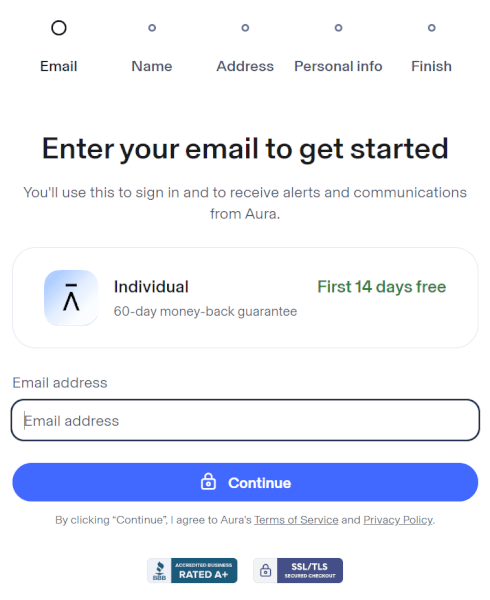
With Aura, setting up is a breeze. To sign up with Aura, head to their website, enter your name, email, phone number, and create a strong password. Once you’re in, the user interface is super intuitive. Features like VPN and antivirus are easy to access, and separate downloads for things like Safe Gaming keep everything simple. Plus, the browser extensions add an extra layer of security with password management and ad blocking.
Identity Guard, on the other hand, offers a three-tiered system, which means you might need to spend a bit more time selecting the right plan. However, the setup process remains user-friendly. After choosing your plan, you will create a password, enter your details, and provide a payment method. We appreciated the helpful pop-ups that explain why certain information is needed, which is beneficial if you’re new to this type of service. The dashboard is clear and easy to navigate, displaying your digital security status at a glance. Since it runs as cloud-based software in your browser, no downloads are required.
Navigating your dashboard and apps
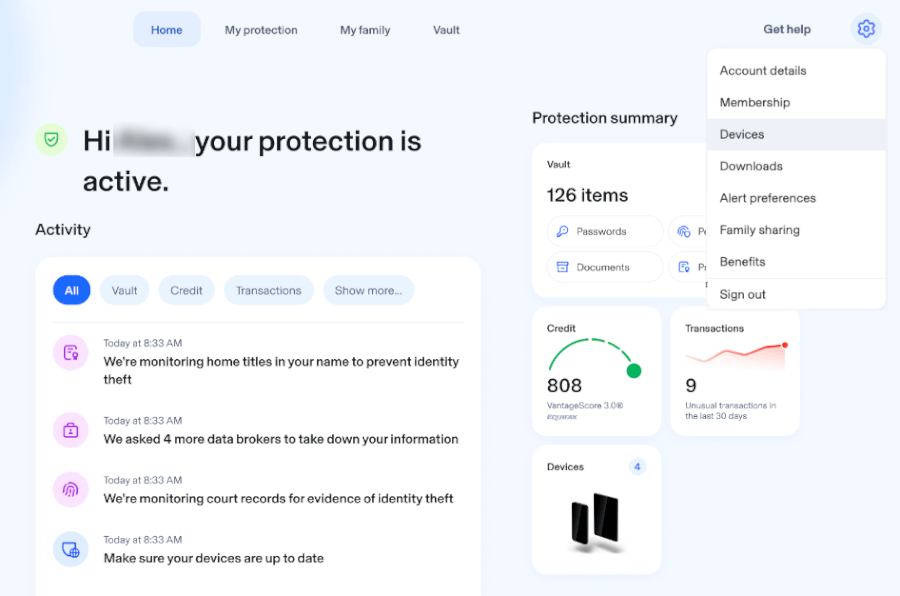
Aura’s app and dashboard are super user-friendly, even though they’re packed with features. It’s easy to access identity alerts and manage settings. The desktop app pulls all the security features into one place, keeping us updated on our credit score, recent transactions, and the status of our personal information. We love that you can customize the dashboard to show what’s most important, like social media activities, financial account statuses, or the security of personal identifiers like Social Security and credit card numbers.
For mobile users, Aura’s app performs excellently on both iOS and Android platforms. Its sleek design makes managing protection on the go a breeze. It’s easy to manage your Aura account and link financial accounts for monitoring. Instant notifications keep you informed of any security issues, so you stay protected wherever you are. One thing we noticed, though, is that Aura has multiple apps for different features, which can sometimes make things a bit confusing compared to services that bundle everything into one app.

Identity Guard’s dashboard offers a more focused, streamlined experience. It gives quick access to popular tools like alerts, monthly credit score, credit reports and scores, home title monitoring, transaction monitoring, and security freeze. Everything is laid out clearly, so it’s easy to find and use the tools you need. For mobile use, Identity Guard offers apps for both Android and iOS, which are perfect for quick checks and receiving alerts. While the mobile app is handy for on-the-go monitoring, we found the desktop version essential for in-depth management.
Customer support and resources
When you need help, having reliable customer support is a game changer. Both Aura and Identity Guard offer solid support, but our experience with Aura really stood out due to its 24/7 availability, making it easy to get help whenever you need it. Identity Guard, while comprehensive, only offers support during specific hours and days, with no help on Sundays.
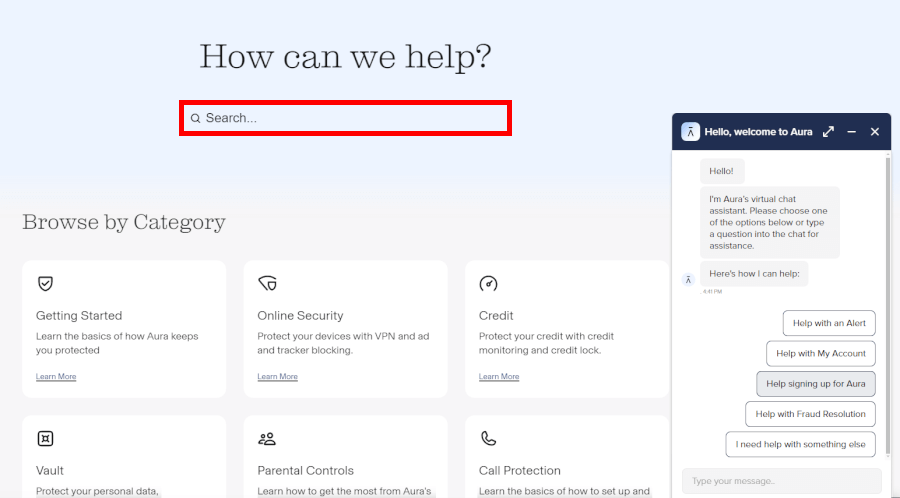
Aura’s US-based customer support is fantastic. Whenever we had an issue, we could reach out by phone, email, or live chat, and we always got quick, expert help. If identity theft happens, Aura’s dedicated fraud resolution specialists provide clear guidance and support, making the recovery process smoother. For those who prefer handling issues independently, Aura offers a comprehensive library of self-help documents and articles.
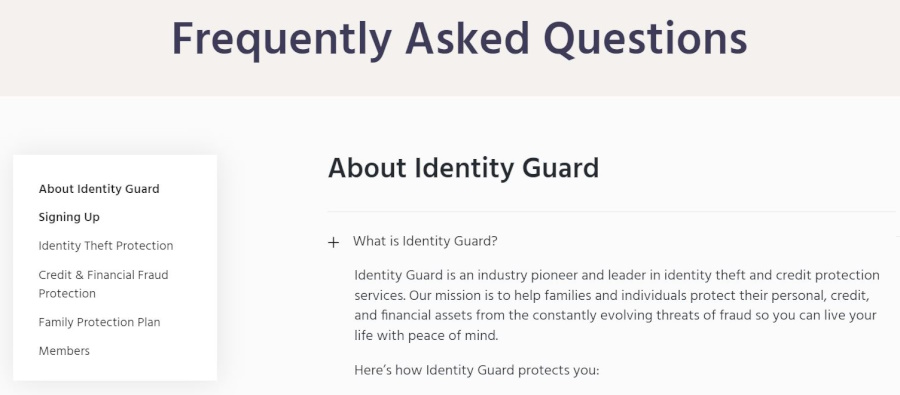
Identity Guard also provides commendable support through phone and email. We found their representatives helpful and friendly. You can contact them during normal business hours from Monday to Saturday and weekday evenings, although they are closed on Sundays. While there’s no live chat option, their phone and email support were efficient. For emergencies, Identity Guard offers 24/7 access to a live representative, ensuring support is available when it’s most needed.
Which service is more user-friendly?
Aura emerges as the more user-friendly choice with its intuitive setup, modern interface, and 24/7 customer support. Its mobile apps also deliver convenience and functionality, ensuring users can stay protected wherever they go.
Ease of use and support winner: Aura
Financial health: Who offers more helpful credit reports and scores?
When it comes to keeping tabs on your financial health, both Aura and Identity Guard offer valuable tools like credit reports and scores. Aura ensures you stay in the know with monthly credit scores and annual reports from Equifax, Experian, and TransUnion, available across all their plans. This means you can easily track changes and address any issues promptly.
On the other hand, Identity Guard reserves three-bureau credit monitoring for its “Total” and “Ultra” plans. Opting for the “Ultra” plan gives you access to monthly credit scores and comprehensive alerts, while the Total plan offers essential alerts and a monthly credit score. Identity Guard also provides a risk management report, which gives you insights into your vulnerability to identity fraud, helping you stay proactive in protecting your identity.
Both services are committed to helping users safeguard their financial well-being, with Aura’s inclusive approach to credit monitoring providing straightforward access to essential financial data for all its users.
Financial health winner: Aura
Security and privacy: Is Aura or Identity Guard a safer choice?
When keeping your identity safe online, Aura and Identity Guard take slightly different paths while ensuring your security is their top priority. Aura stands out with its helpful parental controls and robust remediation services, providing peace of mind for families and individuals alike. On the other hand, Identity Guard shines in monitoring social media accounts, offering vigilant protection against digital threats.
Both services prioritize your security with features like two-factor authentication (2FA), adding an extra layer of defense to your accounts. Their shared commitment to privacy and data security is evident, backed by clear policies that protect your personal information from unauthorized access and misuse.
Aura’s broad device compatibility and round-the-clock live chat support make managing your security straightforward and accessible. Meanwhile, Identity Guard ensures your data is securely encrypted through trusted third-party services, reinforcing its dedication to safeguarding your privacy.
When it comes to data handling, both Aura and Identity Guard are pretty transparent. They only collect the essential information needed to provide their services, making sure your data is managed with trust and care. Also, since Aura has acquired Identity Guard, their privacy policies are aligned.
Security and privacy winner: Aura
Plans and pricing: Does Aura or Identity Guard offer greater value for money?
When considering identity theft protection, both Aura and Identity Guard provide transparent pricing with options tailored to different needs.
Aura offers three well-structured plans for identity theft protection, each designed to cater to different needs.
Note: you can get reduced prices with this coupon.
- Individual: This plan is perfect for single users, priced at
$12 monthly($9/mo. with coupon) when billed annually. It encompasses $1 million in identity theft insurance, 1GB of secure cloud storage in the Vault, and comprehensive security for up to 10 devices. - Couple: Ideal for two users, this plan is available at
$22 per month($17/mo. with coupon) with annual billing. It includes the same $1 million insurance coverage for identity theft, doubles the cloud storage to 2GB, and extends device security coverage to 20 devices. - Family: Designed with families in mind, this plan is priced at
$37 per month($25/mo. with coupon) when billed annually. It significantly increases the insurance coverage to $1 million per adult, provides a generous 5GB of cloud storage space, and secures up to 50 devices.
Exclusive Aura Coupon:
Get 68% Off Aura subscription plans with the coupon below:
(Coupon is applied automatically; 60 day money-back guarantee.)
If safeguarding your children is your main concern, Aura’s “Kids” plan is an excellent choice. It offers parental controls powered by Circle, ensuring safe browsing and time management across all devices for an unlimited number of children.
Each plan includes $1 million identity theft insurance and 24/7 support, backed by a 60-day money-back guarantee.
At the same time, Identity Guard offers several tiers:
- Value: At $6.67 per month, this plan includes basic identity theft protection, including dark web surveillance and high-risk transaction alerts.
- Total: Priced at $16.67 per month, this plan offers comprehensive protection, including credit monitoring, dark web surveillance, high-risk transaction alerts, and social media account monitoring.
- Ultra: At $25.00 per month, this top-tier plan provides the most extensive coverage. It includes all features from the “Total” plan plus enhanced fraud resolution services and regular credit score updates.
For those seeking family-focused protection, Identity Guard offers plans ranging from $10 to $23.99 per month, covering up to five adults and an unlimited number of children. These family plans ensure comprehensive coverage for your entire household.
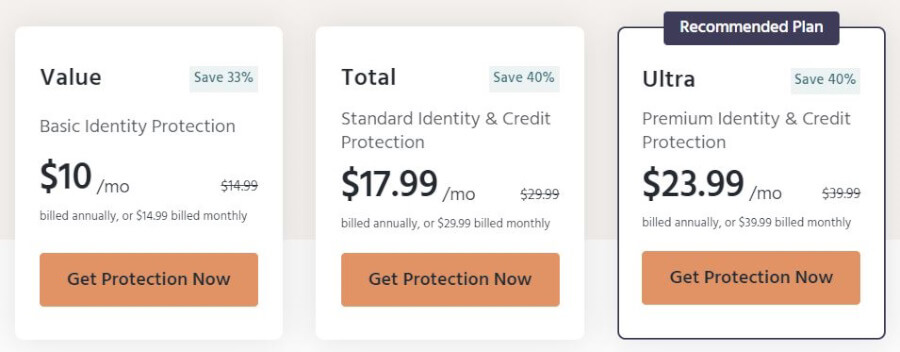
Identity Guard offers a variety of pricing tiers, making it easier to find something that fits your budget. We found their lowest-priced tier to be one of the most affordable among ID theft protection services, which is great for anyone looking to save some money. However, Aura’s plans stand out by offering more comprehensive features and benefits across all tiers, ensuring you get excellent value for your investment.
Plans and pricing winner: Aura
Conclusion: Which service is right for you?
Choosing the right identity protection service means finding one that aligns with your specific needs. Aura stands out with its robust security tools, quick fraud alerts, and clear insurance policies, making it ideal for families. Its modern interface is user-friendly, and the option for a risk-free trial adds peace of mind.
On the other hand, Identity Guard offers reliable protection and essential services tailored to different needs. While it lacks a free trial, its tiered plans provide flexibility and strong security measures.
In summary:
Trustworthiness: Aura
Availability and insurance: Aura
Core identity protection: Aura
Additional digital defenses: Aura
Ease of use and support: Aura
Financial health reports: Aura
Security and Privacy: Aura
Plans and pricing: Aura
Aura takes the lead in this comparison, thanks to its extensive features and commitment to customer satisfaction. While Identity Guard provides specialized services with a solid reputation, Aura’s robust protection suite and competitive pricing make it the clear winner.
Identity theft protection comparisons on RestorePrivacy:
- Aura vs LifeLock
- Aura vs Experian IdentityWorks
- IDShield vs Aura
- Aura vs McAfee
- LifeLock vs IDShield
- Aura vs Incogni
- Aura vs IdentityIQ
- Aura vs IDShield
- Identity Guard vs LifeLock
- LifeLock vs Experian Identity Works
Identity Guard vs Aura FAQ
Are Aura and Identity Guard the same?
No, Aura and Identity Guard are not the same but they share a strong connection due to Aura’s acquisition of Identity Guard. Aura stands out with its superior features and functionality, offering a comprehensive suite of digital security tools, including antivirus, VPN, and parental controls. Meanwhile, Identity Guard is known for its more budget-friendly options, making it accessible for users looking to save money.
What are the main differences between Aura and Identity Guard?
The main differences between Aura and Identity Guard lie in their additional features and approach to identity protection. Aura offers a more holistic security suite, including antivirus software, VPN, and parental controls, making it ideal for families. Identity Guard focuses on specialized identity monitoring tools and social media oversight.
Additionally, Aura includes consistent credit monitoring across all plans, whereas Identity Guard reserves some features for higher-tier plans.
Which service is better for families, Aura or Identity Guard?
Aura is generally considered better for families due to its comprehensive suite of digital security tools. It includes antivirus protection, VPN, parental controls, and generous insurance coverage of up to $5 million for families. These features ensure robust protection for all family members, making Aura a more attractive choice for households seeking all-encompassing security.
This Identity Guard vs Aura comparison guide was last updated on July 21, 2024.

Leave a Reply